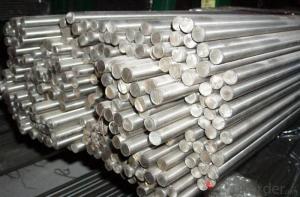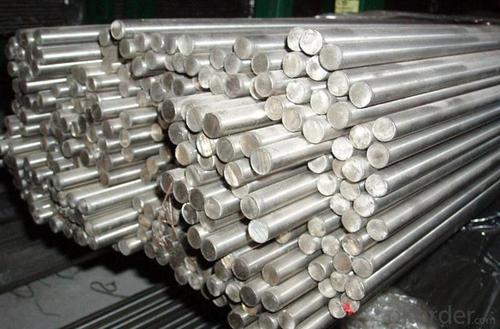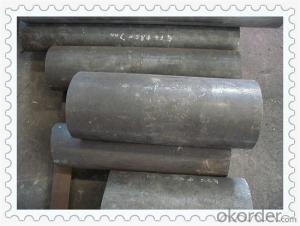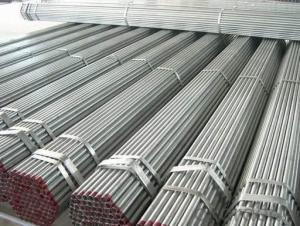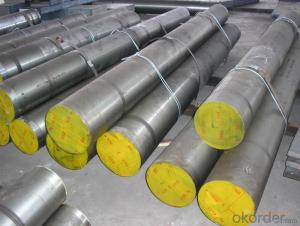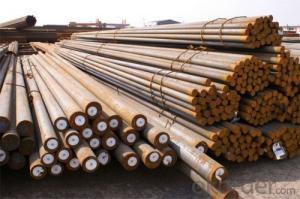Alloy AISI 4140 Material Steel Round Bars
- Loading Port:
- Tianjin
- Payment Terms:
- TT OR LC
- Min Order Qty:
- 25 m.t.
- Supply Capability:
- 50000 m.t./month
OKorder Service Pledge
OKorder Financial Service
You Might Also Like
Specification
Alloy AISI 4140 Material Steel Round Bars
Product Description:
1.Dia:16-320mm
2.Length:4-12m(can be customized)
3.Proceesing :EAF+LF+VD
4.Inspection: Ultrasonic according to the test standards:SEP1921-84,GR.3 CLASS C/C
5. Packing situation: standard seaworthy packing or as customer required
6. Delivery time: 7 days for stock and 30 days for new production
7. Payment: T/T, or L/C at sight.
Chemical Composition:
Grade | C | Si | Mn | P | S | Cr | Mo |
42CrMo4 | 0.38-0.45 | 0.17-0.37 | 0.40-0.70 | ≤0.035 | ≤0.035 | 0.90-1.20 | 0.15-0.25 |
1.7225 | 0.38-0.45 | ≤0.40 | 0.60-0.90 | ≤0.025 | ≤0.035 | 0.90-1.20 | 0.15-0.30 |
4140 | 0.38-0.43 | 0.15-0.35 | 0.75-1.00 | ≤0.035 | ≤0.040 | 0.80-1.10 | 0.15-0.25 |
Aplication:
(1) Generally used for producing the important parts with high strength and good plastic.
(2) After nitrogen treatment, used for producing the important parts with special performance
requirements, such as shafts, gears, fasteners, bolt of large dia steamer etc.
Alloy steel bars are highly appreciated for its striking fetures such as resilient, fine finish, optimum tensile strength and corrosion resistant. We fabricate these products using optimum quality materials based on well versatile technology in complying with the quality standards. These products are widely used in various construction, automobiles and mechanical parts.
Product Show:
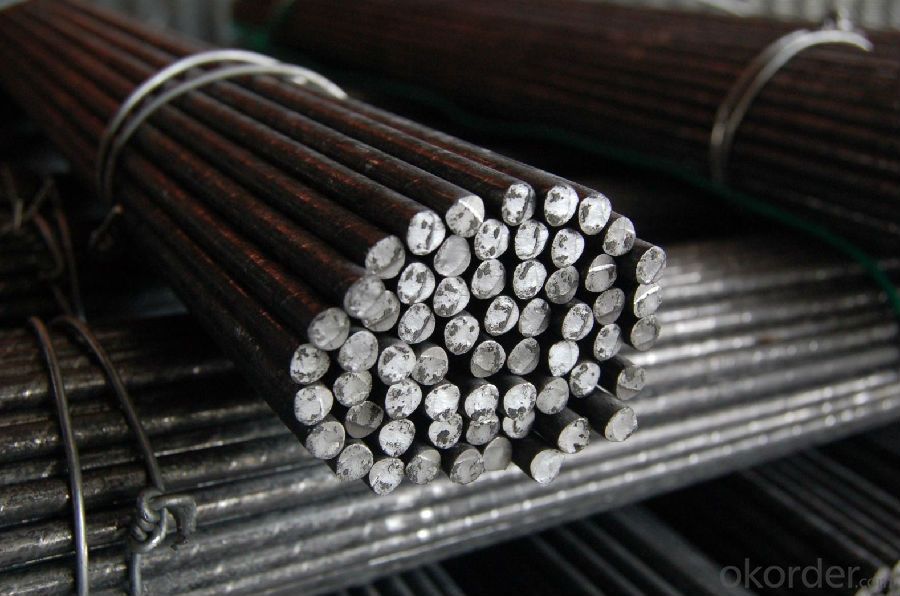
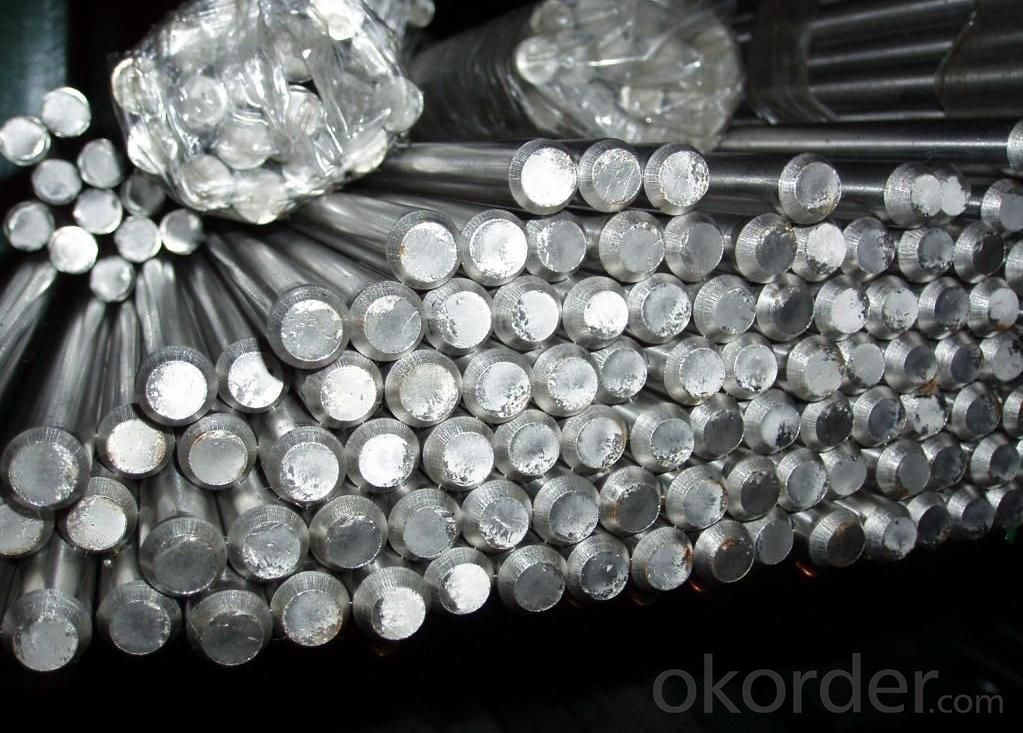
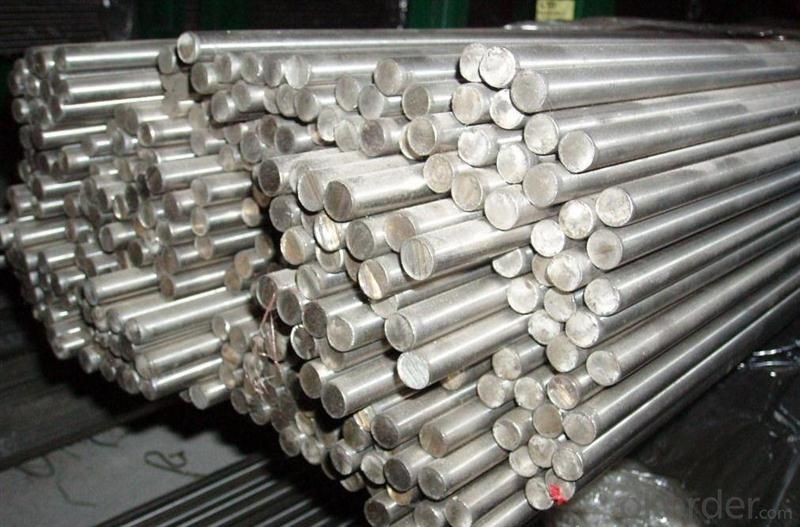
- Q: What are the different methods for improving the toughness of tool steels used in special steel?
- Tool steels used in special steel applications can be toughened through various methods. The goal is to increase their resistance to fracture and ability to absorb energy without becoming brittle. Some techniques for improving the toughness of tool steels include: 1. Alloying: Adding specific alloying elements like chromium, molybdenum, vanadium, and tungsten significantly enhances the toughness. These elements form carbides within the steel matrix, improving toughness. 2. Heat treatment: Proper heat treatment greatly improves toughness. Quenching and tempering are commonly used processes. Quenching rapidly cools the steel, resulting in a hardened structure. Tempering involves reheating and slow cooling to relieve internal stresses and increase toughness. 3. Controlled cooling rates: Optimizing toughness is possible by controlling the cooling rate during heat treatment. Slow cooling allows for a more uniform microstructure, leading to improved toughness. 4. Grain refinement: Refining the grain size enhances toughness. This can be achieved through hot working, controlled rolling, or adding grain refining elements like titanium or zirconium. 5. Surface treatments: Shot peening or nitriding can improve toughness. Shot peening bombards the steel surface with small metal or ceramic particles, creating compressive residual stresses that enhance toughness. Nitriding diffuses nitrogen into the surface, forming a hard and wear-resistant layer. 6. Cryogenic treatment: Subjecting the tool steel to extremely low temperatures for an extended period refines the microstructure and reduces residual stresses, improving toughness. 7. Powder metallurgy: Techniques like hot isostatic pressing or sintering can produce tool steels with improved toughness. Fine powder, high pressure, and temperature result in a more uniform and fine-grained microstructure, increasing toughness. Ultimately, the specific methods selected and combined depend on the tool steel's requirements and intended application. By carefully considering these techniques, manufacturers can enhance the toughness of tool steels for demanding special steel applications.
- Q: How are tool steels used in the manufacturing of cutting tools?
- Tool steels are widely used in the manufacturing of cutting tools due to their excellent hardness, wear resistance, and toughness properties. These steels are specifically designed to withstand high temperatures, intense pressures, and repetitive impacts during cutting operations. Tool steels are utilized to make various cutting tools such as drills, milling cutters, saw blades, and dies. They provide the necessary strength and durability required for cutting, shaping, and forming various materials including metals, plastics, and wood. Additionally, tool steels can be heat treated to further enhance their hardness and wear resistance, ensuring a longer lifespan and improved performance of cutting tools.
- Q: What are the different methods of testing special steel for quality assurance?
- There are several methods of testing special steel for quality assurance, including mechanical testing, chemical analysis, non-destructive testing, and metallographic analysis. Mechanical testing involves measuring the steel's strength, hardness, and toughness through techniques such as tensile testing, impact testing, and hardness testing. Chemical analysis helps determine the composition and impurities in the steel through methods like spectroscopy and elemental analysis. Non-destructive testing methods like ultrasonic testing, magnetic particle testing, and radiographic testing are used to detect any defects or flaws in the steel without causing damage. Metallographic analysis involves examining the steel's microstructure through techniques like optical microscopy and electron microscopy to assess its internal structure and identify any potential issues.
- Q: What are the common challenges in heat treating titanium alloys?
- Some common challenges in heat treating titanium alloys include the high reactivity of titanium with oxygen and other elements, the need for precise temperature control due to the narrow range of heat treatments, and the potential for distortion or warping of the material during the heat treatment process.
- Q: How is nitriding steel used in the production of tools and dies?
- Nitriding steel is used in the production of tools and dies through a process called nitriding. This involves introducing nitrogen into the surface of the steel, which forms a hard layer of nitrides, increasing the overall hardness, wear resistance, and corrosion resistance of the material. This enhanced surface hardness makes the tools and dies more durable and long-lasting, allowing them to withstand the high stresses and temperatures experienced during cutting, forming, and shaping processes. Additionally, nitriding steel can also improve the fatigue strength and reduce the friction of the tools and dies, enhancing their performance and efficiency in various industrial applications.
- Q: What are the main advantages of using special steel in the construction industry?
- The main advantages of using special steel in the construction industry are its exceptional strength, durability, and versatility. Special steel has a high tensile strength, allowing for the construction of structures that can withstand heavy loads and extreme conditions. Its durability ensures a longer lifespan for buildings, reducing maintenance costs. Additionally, special steel can be manufactured in various forms and shapes, making it highly versatile and adaptable to different construction requirements.
- Q: How is special steel recycled or disposed of?
- The material known as special steel, or alloy steel, is highly valuable and in great demand because of its unique properties and uses. When it comes to disposing of or recycling special steel, there are several methods available depending on the condition and quality of the material. Recycling is the most preferred and commonly used method for managing special steel. The recycling process involves gathering, organizing, and melting down the steel scrap so that it can be reused in the production of new steel products. This process helps to preserve natural resources, reduce energy consumption, and minimize waste. The initial step in recycling special steel involves collecting scrap or end-of-life products that contain this material. These sources can include discarded machinery, automotive parts, construction materials, and even old appliances. Once collected, the steel is sorted and separated from other materials, such as plastic, rubber, or non-ferrous metals, using various techniques like magnetic separation, eddy current separation, or manual sorting. After the sorting process, the steel scrap is sent to a specialized recycling facility, commonly referred to as a steel mill or foundry. Here, the scrap is melted down in large furnaces at extremely high temperatures. During this process, impurities and contaminants are removed, and alloying elements can be added to achieve the desired composition and properties of the steel. Once the steel has been melted and purified, it is cast into various forms such as ingots, billets, or slabs, which can then be used to manufacture new steel products. These products may include pipes, bars, plates, or even new machine parts, depending on the specific needs of the industry. When it comes to disposal, special steel should be seen as a valuable resource and not simply discarded as waste. However, in cases where the steel is irreparably damaged or contains hazardous materials, proper disposal methods must be followed. This typically involves seeking advice from specialized waste management companies that can handle the safe and environmentally friendly disposal of such materials. In conclusion, special steel is primarily recycled due to its high value and the various benefits associated with recycling. Through the processes of collection, sorting, and melting, special steel can be transformed into new products while conserving resources and minimizing waste. Proper disposal methods are only necessary in exceptional cases where recycling is not feasible or when dealing with damaged or hazardous materials.
- Q: What are the main advantages of using special steel in the food processing industry?
- The main advantages of using special steel in the food processing industry are its high corrosion resistance, durability, and hygienic properties. Special steel is resistant to rust and corrosion, ensuring that it does not contaminate the food being processed. It also possesses excellent strength and durability, making it suitable for handling heavy loads and withstanding harsh operating conditions. Furthermore, special steel is easy to clean and maintain, promoting a higher level of hygiene in food processing facilities.
- Q: What are the different methods of preventing stress relaxation in special steel?
- Preventing stress relaxation in special steel can be achieved through various methods. One effective approach is the utilization of heat treatment, specifically by employing the annealing process. Annealing consists of heating the steel to a specific temperature and gradually cooling it down. This technique successfully alleviates internal stresses within the steel, thus preventing stress relaxation. Another effective method involves employing stress relieving techniques. These techniques necessitate the controlled application of stress to the steel, typically through cold working or mechanical deformation. By doing so, the steel can effectively release any accumulated stress and avoid relaxation over time. Furthermore, incorporating alloying elements into the steel can also aid in preventing stress relaxation. Certain alloying elements, such as molybdenum and chromium, enhance the steel's strength and stability, thereby improving its resistance to stress relaxation. Lastly, meticulous design and engineering of components also contribute to the prevention of stress relaxation. Engineers can minimize the risk of stress relaxation in special steel applications by considering factors such as load distribution, material thickness, and stress concentration points. In conclusion, a combination of heat treatment, stress relieving techniques, alloying elements, and thoughtful design can be employed to effectively prevent stress relaxation in special steel.
- Q: What are the different surface hardening methods used for special steel?
- Special steel can be enhanced in hardness and wear resistance through various surface hardening methods. These techniques are employed to cater to specific applications. Some commonly utilized methods for surface hardening special steel are as follows: 1. Carburizing: By introducing carbon into the steel's surface via heating it in a carbon-rich environment, such as a carbon-containing gas or liquid, carburizing is performed. The steel absorbs the carbon, resulting in a high-carbon layer on the surface. This process enhances the steel's hardness and wear resistance, making it suitable for applications demanding strength and durability. 2. Nitriding: Nitriding involves introducing nitrogen into the steel's surface. This is achieved by heating the steel in an atmosphere of ammonia gas. The nitrogen diffuses into the steel, forming a nitride layer on the surface. Nitrided steel exhibits increased hardness, improved wear resistance, and enhanced fatigue strength. It is commonly used in applications requiring high surface hardness, like gears, bearings, and tools. 3. Induction hardening: Induction hardening is a localized surface hardening method that entails heating specific areas of the steel using electromagnetic induction. The heated regions are then rapidly quenched, resulting in a hardened surface layer. Induction hardening is employed for components demanding high surface hardness, such as shafts, gears, and camshafts. It provides precise control over the hardened area, leading to improved wear resistance and fatigue strength. 4. Flame hardening: Flame hardening involves heating the steel surface using a high-temperature flame and quickly quenching it. This process creates a hard surface layer while leaving the core of the steel relatively unchanged. Flame hardening is commonly used for large and intricately shaped components, including axles, crankshafts, and machine tool slides. 5. Laser hardening: Laser hardening is a precise and localized surface hardening method that utilizes a high-energy laser beam to heat and melt the steel's surface. By moving the laser beam across the surface, a hardened layer is formed. Laser hardening provides precise control over the hardened area, resulting in improved wear resistance and fatigue strength. It is commonly applied to small and intricate components, such as cutting tools, molds, and dies. These are merely a few examples of the surface hardening methods frequently employed for special steel. Each method offers distinct advantages and is selected based on the specific requirements of the application. By utilizing these surface hardening techniques, special steel can be customized to meet the needs of various industries, including automotive, aerospace, and manufacturing.
Send your message to us
Alloy AISI 4140 Material Steel Round Bars
- Loading Port:
- Tianjin
- Payment Terms:
- TT OR LC
- Min Order Qty:
- 25 m.t.
- Supply Capability:
- 50000 m.t./month
OKorder Service Pledge
OKorder Financial Service
Similar products
Hot products
Hot Searches
Related keywords
